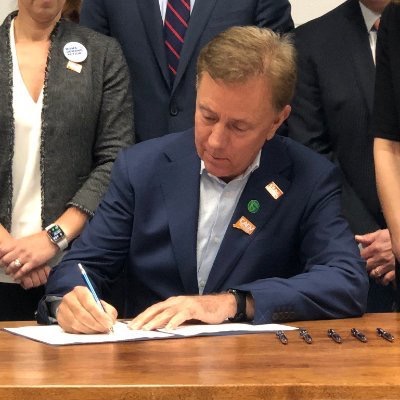
Governor Ned Lamont on Wednesday signed legislation enacting a biennial budget for fiscal years 2020 and 2021, which closes the $3.7 billion deficit he inherited without any tax rate increases or significant cuts to essential services. The governor’s first state budget was adopted before the start of the fiscal year, is honestly balanced, and comes on the heels of an historic agreement negotiated with the state’s hospitals that will save Connecticut taxpayers billions of dollars well into the future.
The governor specifically noted that the budget:
- Increases funding for education and workforce development;
- Protects the most vulnerable communities and services;
- Does not reduce municipal aid funding for any town and city in the state, giving mayors and first selectmen security and stability when adopting their own respective budgets; and
- Includes the largest rainy day fund in state history
“On the day I took the oath of office, we were looking at a $3.7 billion deficit, and today I am proud to say that we’ve closed it without an increase to tax rates and while ensuring that the safety net remains intact for the most vulnerable in our communities,” Governor Lamont said. “For years, instability in the state’s finances has resulted in slow growth and volatility in our economy – and this budget was adopted with a focus on providing the foundation from which our state can grow. When the fiscal year closes, Connecticut will have the largest rainy day fund in history and this budget maintains and grows our reserves, providing reliability and predictability for our taxpayers, businesses, and those looking to invest in our state well into the future.”
|
Highlights of the Fiscal Year 2020/2021 Biennial Budget • Delivers stability and predictability to taxpayers and businesses by addressing the fixed costs that stunts the state’s growth year after year ◦ Makes changes to state employee and retiree healthcare programs that will result in a savings of $185 million over the next two years. ◦ Makes a $75 million payment toward the historic cumulative GAAP deficit. ◦ Sets aside $381 million to provide a clear path forward to restructuring the Teachers’ Retirement System, allowing the state to mitigate the potential cliff as it would have faced in the late 2020s and early 2030s when annual payments could have tripled. ◦ Puts Connecticut on a course for the most robust savings the state has ever had, and placing it among the best states in the country in terms of budget reserves. • Funds the Special Transportation Fund (STF) ◦ Stabilizes the STF in the short term to maintain the existing level of infrastructure investments for our roads, bridges, and highways. ◦ Fully implements the car sales tax into the fund by 2023. • Holds the sales tax rate flat while taking steps to modernize our tax policy ◦ Generates revenue from areas of growth, such as digital downloads and services, equalizing the policy with brick-and-mortar retail. ◦ Begins to broaden our sales tax base by including interior design, dry cleaning and parking in a way that chooses fewer winners and losers.
• Does not increase the income tax rate for anyone • Protects and supports Connecticut’s working families and vulnerable communities ◦ Allocates funding to enact two historic pieces of legislation – increased minimum wage and paid family and medical leave – both designed to help lift families out of poverty, combat persistent pay disparities between races and genders, and allow individuals to take time to care for themselves or their loved ones. ◦ Includes $29 million in funding over two years for wage increases for nursing home workers and expands eligibility for HUSKY A adults to 160 percent of the federal poverty level. • Holds Connecticut cities and towns harmless ◦ Keeps municipal funding flat over the next two years. Contains no reductions from FY 2019 municipal aid payment lists and adjusts car tax formula to reflect year-over-year grand list changes. • Increases funding for public education and workforce development ◦ Honors the ECS formula and provides an additional $112 million over two years. ◦ Includes a plan for Debt-Free Community College beginning in the fall of 2020 and adds $250,000 to the Minority Teacher Incentive Program. ◦ Connecticut will invest more money into education and workforce development to strengthen the existing pipeline between our public education institutions and areas of growth such as advanced manufacturing and biotechnology. ◦ Creates a partnership with Dalio Philanthropies that will provide matching funds for disconnected and disengaged youth. • Supports Connecticut businesses ◦ Eliminates the $250 business entity tax – a tax that is mainly paid by small businesses. ◦ Phases-out the Capital Base tax under the Corporation Tax by January 1, 2024. • Modernizes state government ◦ Provides over $6 million in funding for a digital front door - a new digital service that will move the public’s interactions with state government online, and provide services that are personalized, more secure, efficient, and cost-effective. • Protects the environment and invests in clean energy ◦ Establishes targets and requires agency studies for increasing zero-emission vehicles in the state fleet, and provides funds for the state’s zero emission vehicle program to incentivize state residents to purchase such vehicles. ◦ Imposes a $0.10 tax on environmentally unfriendly plastic bags for two years, followed by an outright ban. ◦ Protects the state’s ratepayer funded energy efficiency and green bank programs. • Promotes health and wellness ◦ Raises the age for the consumption of tobacco products from 18 to 21 years old. ◦ Places a new ten percent wholesale tax on e-cigarettes and a 40 cents per mL tax on “closed” e-cigarettes to bring e-cigarettes closer in line to the state’s cigarette tax. |